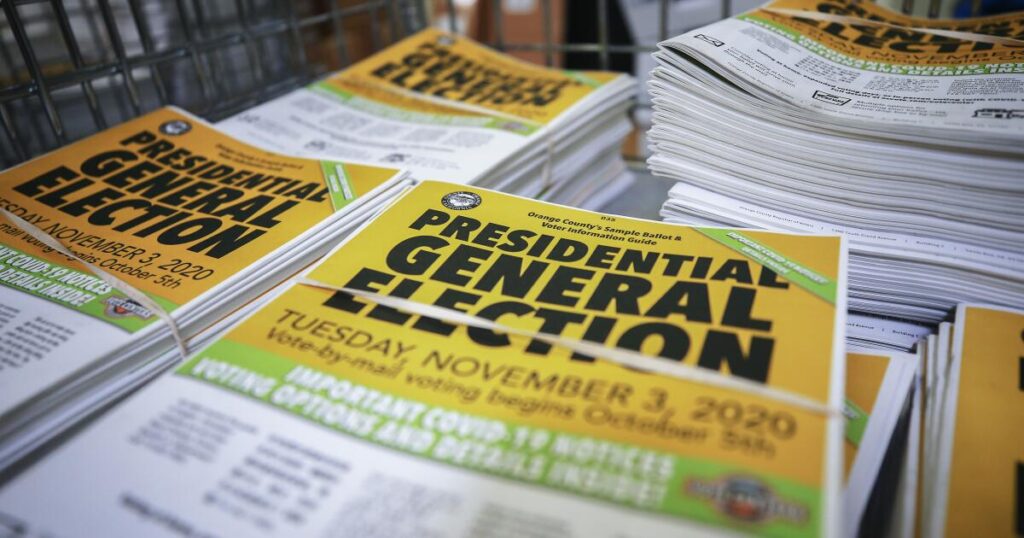In California, where ballots often contain pages for candidates and ballot measures, most voters rely on state-provided guides for election information, a new poll finds. But with so much at stake, Californians are also seeking information from a variety of other sources, including social media, though many say it’s an unreliable source.
The UC Berkeley Institute of Government found that 58% of voters turn to official voter guides, 40% turn to newspapers or magazines, 39% turn to search engines like Google, and 32% turn to social media sources for election research. According to the report, YouTube is the most frequently cited social media source for election-related news, followed by Facebook, Instagram, X (formerly Twitter) and TikTok.
However, despite their interest in these apps, 60% of voters who get their election-related news from all social media sources said they believe misinformation from these sources is a major problem. Another 22% said it was a minor problem.
“More than 80% of Californians who get their news from social media are concerned that what they see is untrue or inaccurate. Our information ecosystem is in danger, and everyone knows it,” said Common Cause California Executive Director Jonathan Meta-Stein said in a statement. “These extremely powerful technologies, which shape our lives and our democratic conversations to a large extent, should be managed by a wider range of stakeholders – including government, civil society and industry – so that they operate in line with our collective interests.
The poll found that older voters were more likely to rely on official and traditional sources for information, such as voter guides, newspapers and television, while younger people turned to social media, search engines such as Google and their family and friends.
Instagram is the most popular social media choice among young voters. The survey found that 44% of 18- to 29-year-olds use the app to get election-related news, followed by 41% on YouTube and 37% on TikTok. Only 15% of those aged 50 to 64 and only 6% of those aged 65 and older use Instagram for the same purpose.
The poll focused on TikTok, which has recently been scrutinized by the U.S. government for its ties to the Chinese government. In April, President Biden signed a law banning the app from being used in the United States unless an American company holds ownership rights. The news quickly sparked outrage among young Americans who frequently use TikTok. An IGS poll found that 59% of people aged 18 to 29 said they browse TikTok. Black Californians use the app at a higher rate than other racial groups — 58% use it, followed by Latinos at 51%.
Jacqueline Mason, interim executive director of the Foundation for Media Democracy, said the deterioration of local and minority media, coupled with the way online platforms “treat news as political,” has forced people to turn to less reliable sources of information.
“This really leaves people of color, immigrants and non-English speakers searching for information about their interests and communities on social media, which makes them vulnerable to more misinformation and disinformation,” she said.
“If we care about ensuring that voters in all communities have access to the information they need and the information they trust during this election, then we must disrupt disinformation campaigns and get people vaccinated against them. We know disinformation The campaign targets communities of color, so foundations must invest in these communities to help them fight back,” Josh Stearns, senior director of the Public Squares Program at the Democracy Fund, said in a statement.
“Technology platforms have a huge role to play, but until they get serious about combating disinformation, the best solutions are driven by people — organizers, journalists, trusted messagers,” he added.
The poll found that an overwhelming majority of Californians support the impending U.S. ban on TikTok — 57%. But among those who regularly use TikTok, support dropped to 23%.
“[Non-users] They are very supportive of what the government is doing because they are concerned about the problems that exist,” DiCamillo said. “The Chinese government may use algorithms to shape what people see, or they may have access to large amounts of personal information. There are concerns about them — legitimate concerns, at least among California voters.
The poll, funded by the Evelyn and Walter Haas Jr. Fund, surveyed 5,095 registered voters across California in English, Spanish, Chinese, Vietnamese and Korean.

